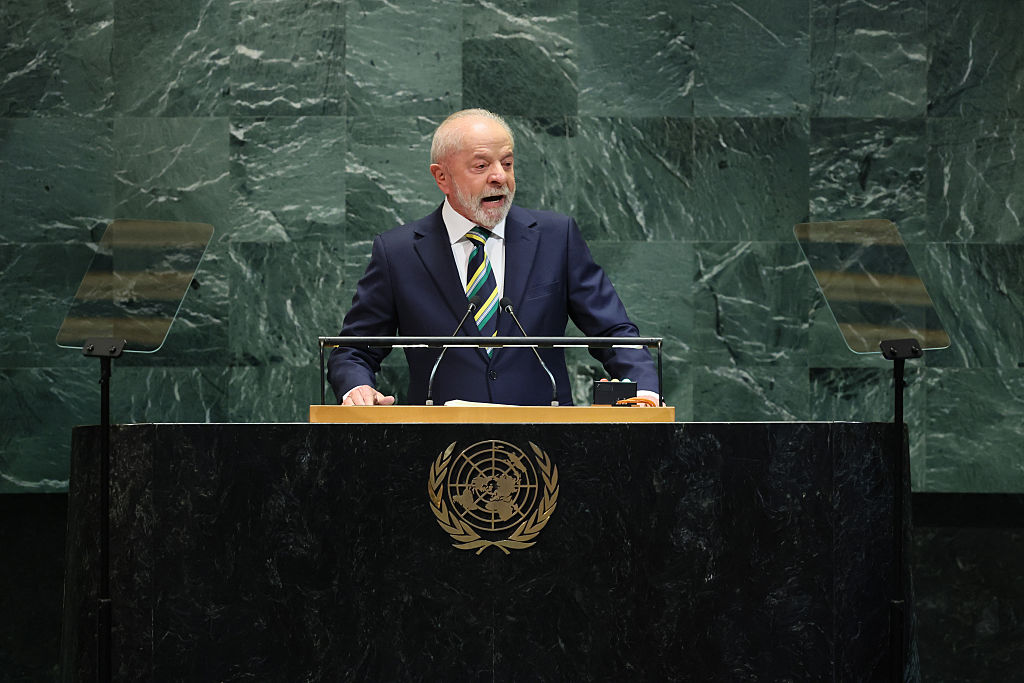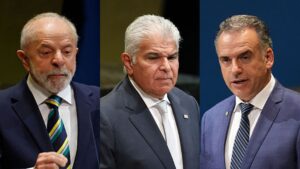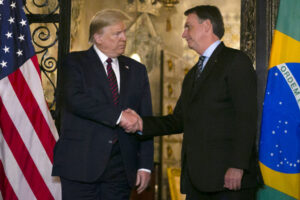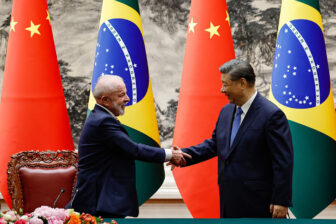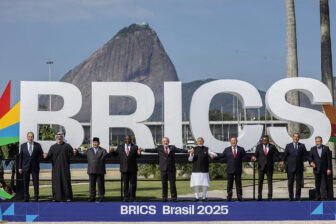Donald Trump’s Brazil strategy was not working. Instead of helping former President Jair Bolsonaro avoid prison, or be allowed to run again in 2026, a barrage of U.S. tariffs and sanctions was having the opposite effect—hastening Bolsonaro’s conviction while boosting the popularity of his rival, President Luiz Inácio Lula da Silva. Brazil’s economy seemed to handle the strains surprisingly well, while a procession of business leaders to the White House in recent weeks warned of risks to U.S. inflation from coffee, beef and other goods.
So the U.S. president did what he has on other occasions: He listened. And then he changed course. Trump’s brief encounter with Lula at the United Nations, after which he proclaimed they had “excellent chemistry,” was not a chance meeting. It was not a case of another Republican president helplessly succumbing to Lula’s famous charm. It was, rather, a meeting orchestrated over several weeks by a host of actors including Trump’s special envoy Richard Grenell, whose covert trip to Brazil earlier this month remarkably went unreported until O Estado de S.Paulo finally broke the news Thursday night.
Both presidents plan to speak, by phone or videoconference, this week or next. If it goes well enough, an in-person meeting may follow. Officials in both capitals are nervously wondering: What now? Is Trump really interested in cutting a deal with Lula? Or is this just a prelude to another blow-up, to Lula being unceremoniously humiliated, a la Vladimir Zelensky or Cyril Ramaphosa, before the eyes of the world?
The most likely answer is that Trump wants to turn down the temperature on Brazil, but only a bit. The president now appears to understand, thanks to Grenell and others, that there is no realistic path to Jair Bolsonaro being allowed to run for president next year. His legal troubles are too severe, and his political support in Brasília too thin—a reality even most loyal bolsonaristas admit in private. On the other hand, Trump would never abandon the Bolsonaro family, much less admit defeat. Especially in a case where Trump sees strong parallels with the so-called “witch hunt” he faced himself in the United States.
A middle path might be to maintain tariffs on Brazil at 50%, but add to the already long list of goods that are exempt. Magnitsky Act sanctions against Supreme Court Justice Alexandre de Moraes and his wife would be maintained—but not expanded to include other judges and politicians, at least for now. Taken together, these measures would help protect the U.S. economy and save a bit of face for both sides. But they would also keep pressure on Lula, Brazil’s Congress and Supreme Court to show some leniency to Bolsonaro and his supporters—by reducing jail sentences, passing some kind of amnesty law, or perhaps allowing the former president, who is in ill health, to serve his sentence under house arrest.
Diplomats are right to be nervous: The road to de-escalation is fraught. Both presidents sincerely believe they are the one defending democracy. Both still have many advisers egging them on to fight. Both have notorious tempers. If Lula tries to lecture Trump, or simply rubs him the wrong way in a conversation longer than the “39 seconds” Trump says they spent together at the UN, all bets are off. Meanwhile, even for such a modest deal, Trump will demand a war trophy. It’s highly doubtful Lula will be willing to offer the kinds of one-sided concessions that Japan, Korea, the European Union and Ukraine did, given the way this confrontation has breathed new life into a third term that previously seemed somewhat uninspired and restored his reputation as a major figure on the world stage.
But the opportunity is there. The most fertile area for a deal may lie in critical minerals – specifically rare earths. Brazil has the world’s second-largest reserves behind China, but has largely failed to exploit them because of a lack of capital and know-how that the United States is well-positioned to provide. Trump has shown a clear interest in rare earths, making them the axis of his deal with Ukraine for example, while Lula is said to be willing to help influence legislation to help attract U.S. companies. Brazil might also agree to back away from some controversial regulation of digital speech and artificial intelligence that has alarmed U.S. technology companies, or try to help manage the crisis in Haiti, a major source of emigration to the United States. Though all parties would deny it, a “gentleman’s agreement” with the Supreme Court could ensure Bolsonaro remains under house arrest, sparing everyone the humiliating spectacle of him being led away to prison in handcuffs.
Even so, there will probably never be triumphant handshakes in the Oval Office or Mar a Lago. Some degree of sanctions, tensions and insults are likely to continue for as long as both men are in office. But Trump would get distance from a failed policy in a country he does care about—but is not a top priority either. Lula, ironically, may face a more challenging reelection with Bolsonaro out of the race than in it; he hopes an accommodation will stop, or at least restrain, attempts by Trump to disrupt next year’s campaign. At least for the moment, it’s possible to imagine both sides getting what they need. Even if it takes longer than 39 seconds.



